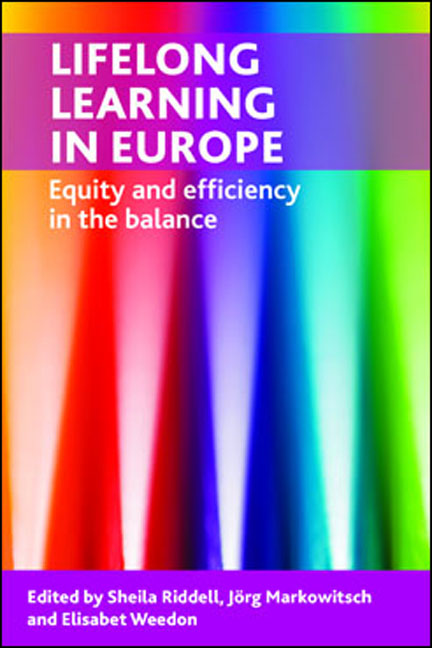Book contents
- Frontmatter
- Contents
- List of figures, tables and case studies
- Notes on contributors
- List of contributors, by country, to the EU Sixth Framework Project ‘Towards a Lifelong Learning Society in Europe: The Contribution of the Education System’ (LLL2010)
- one Lifelong learning and the generation of human and social capital
- two Lifelong learning and the wider European socioeconomic context
- three Neoliberal and inclusive themes in European lifelong learning policy
- four Formal adult education in the spotlight: profiles, motivations and experiences of participants in 12 European countries
- five The sociodemographic obstacles to participating in lifelong learning across Europe
- six The qualification-providing enterprise? Support for formal adult education in small and medium-sized enterprises
- seven Reducing or reinforcing inequality: assessing the impact of European policy on widening access to higher education
- eight Conclusion: the role of lifelong learning in reducing social inequality at a time of economic crisis
- Technical annex to Chapter Four
- Glossary of terms and abbreviations
- Index
four - Formal adult education in the spotlight: profiles, motivations and experiences of participants in 12 European countries
Published online by Cambridge University Press: 01 September 2022
- Frontmatter
- Contents
- List of figures, tables and case studies
- Notes on contributors
- List of contributors, by country, to the EU Sixth Framework Project ‘Towards a Lifelong Learning Society in Europe: The Contribution of the Education System’ (LLL2010)
- one Lifelong learning and the generation of human and social capital
- two Lifelong learning and the wider European socioeconomic context
- three Neoliberal and inclusive themes in European lifelong learning policy
- four Formal adult education in the spotlight: profiles, motivations and experiences of participants in 12 European countries
- five The sociodemographic obstacles to participating in lifelong learning across Europe
- six The qualification-providing enterprise? Support for formal adult education in small and medium-sized enterprises
- seven Reducing or reinforcing inequality: assessing the impact of European policy on widening access to higher education
- eight Conclusion: the role of lifelong learning in reducing social inequality at a time of economic crisis
- Technical annex to Chapter Four
- Glossary of terms and abbreviations
- Index
Summary
Introduction
According to EU policy documents, lifelong learning serves the following four purposes: enhancing or maintaining employability, promoting personal development, fostering social cohesion and developing active citizenship (European Commission, 2010). It is generally believed that – nowadays and in contrast to the humanistic approach of the Faure report in the 1970s – labour market requirements such as employability account for more than 80% of all learning activities, and lifelong learning is therefore often discussed in terms of ‘human resource development in drag’ (Boshier, 1998; see also Chapter Three). Whereas this may apply to learning as a whole, we find that the reasons for participation in formal adult learning are far more diverse and go beyond vocational aspects, while national systems differ widely with regard to the scope of courses on offer.
This chapter reports on a survey of adult learners participating in formal adult education. A precise definition and full account of the data collection procedure are found in the technical annex to this chapter (see pp 163-9). The survey aimed to collect data from 13,000 adult learners in the 13 European countries/regions involved in the LLL2010 project; however, because of problems with data collection in one country, only 12 countries/regions were included in the comparative analysis. In this chapter we sketch a comparative picture of the profile of these participants in formal adult education. We explore questions such as: Who are these learners? What do national adult education systems offer them? Why do they learn? How responsive are national systems to adults’ learning needs? The main reason for exploring these questions is the fact that adult learning is seen as key to the achievement of a ‘competitive and dynamic knowledge based society’ as stated in the Lisbon goals (see Chapter Three). Increasing overall participation rates is clearly an important concern for policymakers; however, it is also important to work with motivated and satisfied adult learners in order to achieve successful learning outcomes (Keller, 1987). Two key questions are addressed in this chapter. First, we examine differences in reasons for participation by level of the current course and country and consider whether the outcomes confirm some old stereotypes, for example with regard to the greater extrinsic motivation of people with lower qualifications – and the more intrinsic motivation of highly educated learners.
- Type
- Chapter
- Information
- Lifelong Learning in EuropeEquity and Efficiency in the Balance, pp. 63 - 86Publisher: Bristol University PressPrint publication year: 2012



